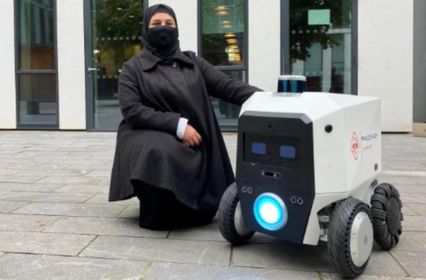The system is being piloted by University of Edinburgh startup Pixconvey, whose founder, artificial intelligence and robotics PhD student Ebtehal Alotaibi, is on a mission to increase trust in autonomous vehicles since losing her aunt in a car accident caused by driver error.
Ms Alotaibi said: “I lost my aunt in 2014 in a car accident that also claimed her husband’s life. She was just 30 years old, and their three children are left without their parents.
“It was the fault of another driver, and I can’t accept that someone could pass away because of someone else’s behaviour when driving. I did some research and found that 94 per cent of car accidents are caused by human error, so there is a lot of potential for driverless vehicles to be safer.”
She wanted to create an autonomous taxi, but after receiving commercialisation advice, she decided to start with a “smaller prototype with a happy face”, which uses the same driverless technology.
Her custom-built robots, Pixie 1 and 2, adapted from the Bayes Centre’s HUSKY model, will deliver orders from the Kings Buildings’ Café in the library to students across campus in a pilot that she hopes could eventually be rolled out across the city.
The team is supported by Edinburgh Innovations, the University’s commercialisation service.
Alotaibi said:
“Getting takeaway food delivered is increasingly expensive, partly due to labour costs and shortages. Where cars are used, it also increases greenhouse gas emissions and, during the pandemic, there were hygiene concerns too. We think Pixconvey can address all these issues: electric vehicles have zero emissions, our business model is an affordable monthly subscription for the restaurant, and the robot sanitises the food cartons using LED rays.
“We hope that it will also create high quality jobs, for instance the technicians who operate and maintain the robots, or the insurers who will have to address this new field of activity.”
Although the Pixconvey robot can navigate roads, traffic lights and pedestrian crossings once it has mapped the terrain, current UK road regulations do not allow for autonomous vehicles without following specific protocols. A successful campus trial would pave the way for a road trial.
Alotaibi added:
“Our robots constantly map their surroundings and can navigate around people, traffic and dogs (who really don’t like them!). But regulation is not yet set up for autonomous vehicles, which is why we are trialling it in a campus environment.”
She will collaborate with Kings Building’s catering service, which will integrate the widely-used Upay takeaway app with Alotaibi’s Pixconvey app. When ordering, if the student choses ‘delivery’, they can specify the location and choose a timeslot. Once the order is ready, the catering staff loads the food into the robot’s cargo.
Using the Pixconvey dashboard, the staff dispatches the robot, which autonomously navigates to the delivery location. Upon arrival, indicated by a dashboard notification, the catering personnel remotely opens the robot’s cargo door. The customer retrieves their order and closes the door, and the robot takes itself back to the catering area.
Dr John Lonsdale, Head of Enterprise at Edinburgh Innovations, said:
“It’s great to see another of our student entrepreneurs showing their ingenuity and initiative to develop new technologies. We are delighted to be able to support Ebtehal in her innovation journey.”
The project also provides a digital twin – a simulation environment enabling researchers to test and refine their algorithms while the robots are operational, both for research and development purposes.
Alotaibi’s PhD supervisor at the University of Edinburgh’s School of Informatics, Dr Michael Herrmann, said:
“This project also provides a test bed for students and researchers to explore machine learning in multi-agent systems. This important research area includes the direct cooperation of humans and robots which will be an important feature of our future work environment.”
Researchers interested in taking part are encouraged to email admin@pixconvey.co


